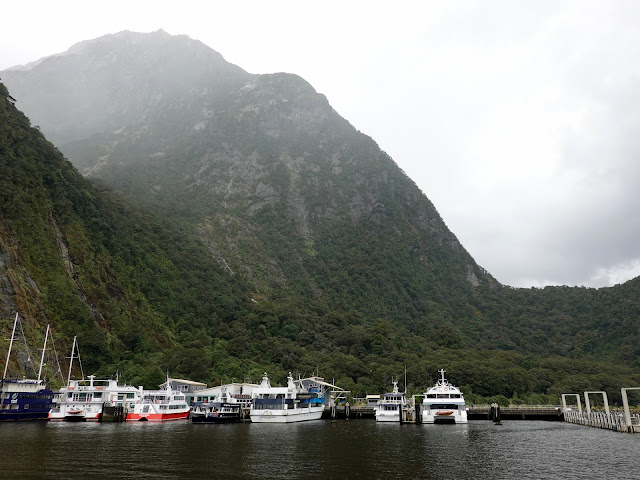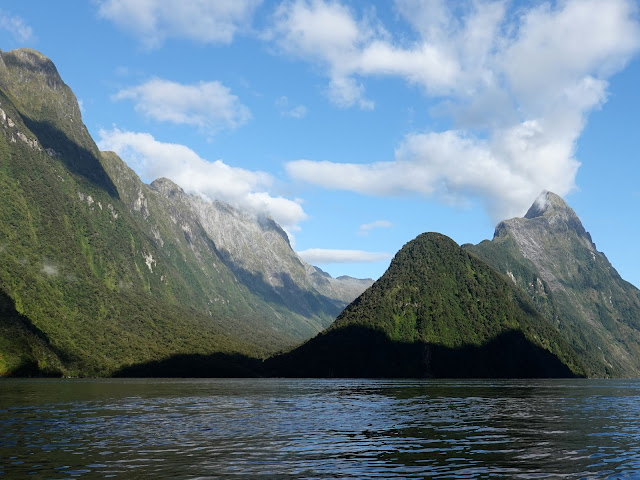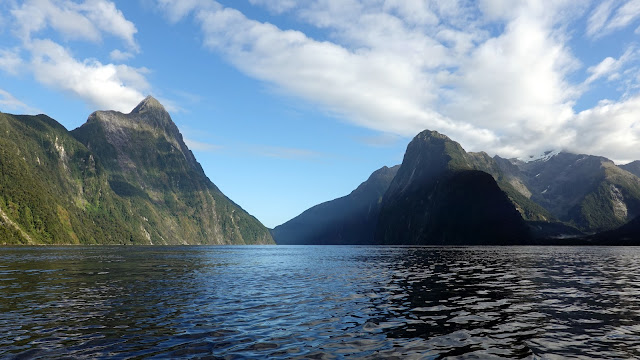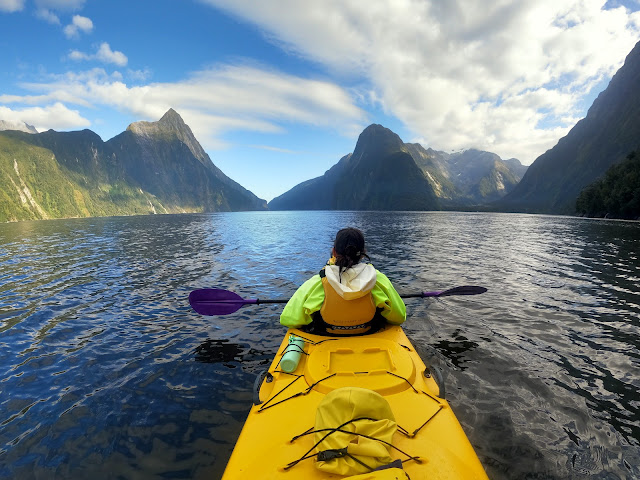Milford Sound 17-03-2023
This map was created using GPS Visualizer's do-it-yourself geographic utilities.
Please wait while the map data loads...
Route: Milford Sound Lodge, Milford Foreshore Walk, Freshwater Basin, Milford Sound Harbour, Milford Sound Highway, Milford Sound Lodge
Date: 17/03/2023
From: Milford Lodge
Parking: Milford Sound Lodge
Start Point: Milford Sound Lodge
Finish Point: Milford Sound Lodge
Region: Fiordland National Park
Route length: 7.3km
Time taken: 02:30
Average speed: 4.7km/h
Ascent: 77m
Descent: 85m
Points of Interest: Milford Sound / Piopiotahi
Milford Sound / Piopiotahi is a breathtaking fjord located in the southwestern part of New Zealand's South Island (Te Waipounamu). Renowned for its awe-inspiring natural beauty and pristine wilderness, Milford Sound is often regarded as one of the most stunning destinations in the world. Milford Sound is part of the larger Fiordland National Park, a UNESCO World Heritage site that encompasses over 1.2 million hectares of untouched wilderness.
 |
| The Earl Mountains from State Highway 94 - the only sealed road into Fiordland National Park |
We spent a couple of days camping at the Milford Sound Lodge, located a short distance from the fiord itself. The reason we spent a few days in the area was to give ourselves the best chance of actually seeing the fiord given its reputation for wetness, which we got to experience first-hand.
 |
| One of the accommodation blocks at Milford Sound Lodge |
 |
| The Cleddau River |
Fiordland National Park is renowned for its wetness, earning it the title of one of the wettest places on Earth. The park's unique geography, characterized by towering mountains and deep fjords, creates an environment where moisture-laden clouds from the Tasman Sea collide with the steep slopes, resulting in abundant rainfall. The park receives an average of 200 days of rain per year, with rainfall measurements often exceeding several meters. That said, Milford Sound / Piopiotahi is worth visiting when it is raining as thousands of ephemeral waterfalls form on the steep cliffs, some for only a few hours at a time.
 |
| Ephemeral waterfalls on the cliffs of Fiordland |
 |
| Many people will experience Milford Sound looking a little like this |
Despite the beauty of its location, there is precious little hiking in the area, unless you set off on one of the multi-day hikes into the wilderness. This includes the most popular of all of New Zealand's Great Walks, the Milford Track which makes a four-day journey from Te Anau to Milford Sound / Piopiotahi. The most accessible and most popular walk in the local area is around the foreshore.
Once it had finally stopped raining, we ventured out of our campervan to the village. The foreshore walk, though short, gives some of the next views of the fiord, even on a grey day like today.
 |
| Milford Sound / Piopiotahi |
The views of the fiord are dominated by the mountains and Mitre Peak in particular - it is an iconic landmark that rises dramatically from the water to a height of 1,692m. The distinctive shape of Mitre Peak resembles a bishop's mitre, hence the name.
 |
| Mitre Peak |
 |
| Mitre Peak |
Speaking of names, you'll notice that I have been using the dual name for Milford Sound / Piopiotahi. This is thanks to the Ngāi Tahu Claims Settlement Act 1998, which included the alternation of significant place names to receive an official dual English and Māori name. Other areas included in the settlement are Aoraki / Mount Cook, Franz Josef Glacier / Kā Roimata o Hine Hukatere and Lake Rotorua / Te Rotorua nui ā Kahumatamomoe.
The English or European name, Milford Sound, is largely incorrect and fairly meaningless. Milford Sound / Piopiotahi is actually a fiord, not a sound. Sounds are formed when a river valley is flooded by the sea, whereas Milford Sound was formed by the erosion of ancient glaciers. The Milford part was described by sealer John Grono in 1823, who named it Milford after Milford Haven, his place of birth.
The Māori name, Piopiotahi, relates to the legend of Maui and his quest to win immortality for mankind. The quest required Maui to kill the goddess of death, Hine-nui-te-po, but Maui failed and was killed instead (I'll let you find out yourself how that came about). His partner, a piopio (a native thrush), flew to Milford Sound to mourn the death of Maui. Piopiotahi translates to 'a single piopio'.
 |
| A South Island Piopio specimen from Te Papa, the National Museum of New Zealand |
If the tide is out you'll be able to get out a short distance onto the sandy bay which gives the best views of Bowen Falls (Hineteawa), the tallest permanent waterfall in Milford Sound / Piopiotahi. Given the amount of rain that had fallen the previous day, the waterfall was looking at its best when we visited. The river that feeds the waterfall also drives a hydroelectric turbine that provides all of the power to the small collection of buildings at Milford Sound / Piopiotahi.
 |
| Heading out at low tide |
 |
| Bowen Falls (Hineteawa) |
 |
| Bowen Falls (Hineteawa) |
 |
| Bowen Falls (Hineteawa) |
Following the sweep of Freshwater Basin took us to the cruise terminal that forms the hub of tourism in Milford Sound / Piopiotahi. Several cruises depart from the wharf and will take you to the mouth of the fiord and for a close encounter with Stirling Falls.
 |
| Freshwater Basin |
 |
| The Lion and The Elephant guard Stirling Falls |
 |
| Milford Sound / Piopiotahi Harbour below Barren Peak |
 |
| Mitre Peak |
 |
| The two-story vessels give a sense of scale to the mountains |
The clouds continued to clear throughout the afternoon and, by the evening, we were treated to a cloud-free sunset over the fiord. For the first time in a couple of days, we could see Mount Pembroke, one of the tallest mountains that surround Milford Sound / Piopiotahi.
 |
| Freshwater Basin below the steep slopes of Cascade Peak |
 |
| Milford Sound / Piopiotahi |
 |
| The terraces show successive glaciations |
 |
| Milford Sound / Piopiotahi |
 |
| The Lion and The Elephant |
 |
| Mitre Peak |
 |
| Mitre Peak |
 |
| Milford Sound / Piopiotahi |
 |
| The Elephant, The Lion and Mount Pembroke |
 |
| Mount Pembroke |
 |
| Milford Sound / Piopiotahi |
We returned the following day to spend a morning kayaking on the fiord, which is an incredible experience. What was more amazing was that we had managed to pick the only dry, sunny period of the entire time we were in the area. Getting out on the water is the best way to experience Milford Sound / Piopiotahi and this was an experience that will live long in the memory.
 |
| It was a beautiful day for a kayak on the fiord |
 |
| Miter Peak, The Elephant and The Lion |
 |
| We were sharing the early morning some a larger visitor, who swiftly departed |
 |
| Milford Sound / Piopiotahi |
 |
| Approaching Stirling Falls |
 |
| Mitre Peak |
 |
| The immense Sinbad Gully separates Mitre Peak from Llawrenny Peaks |
 |
| Milford Sound / Piopiotahi |
 |
| Sheerdown Peak |
 |
| One of the locals |
 |
| Front row seats |









































Absolutely stunning. What a place to go kayaking - that first photo on the water with the mirror like surface is gorgeous.
ReplyDelete